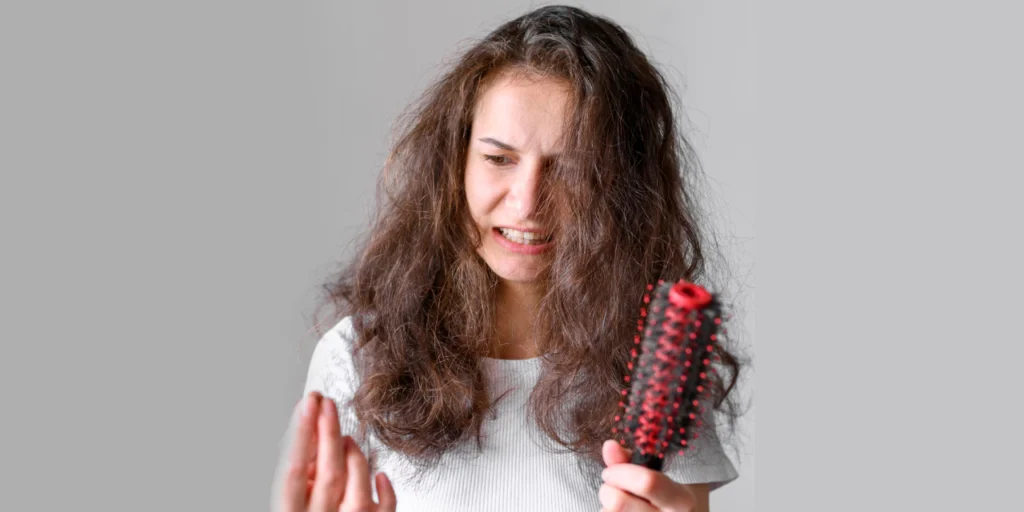Hair is not just about looks; it’s tied to your confidence, your personality, and in many ways, how you feel when you step out into the world. That’s why losing it can be such an emotional rollercoaster. Maybe you’ve noticed more strands on your pillow, a widening part when you look in the mirror, or hair that has suddenly lost its bounce. Whatever the case, hair fall can feel heavier than it looks.
The good part? Most of the time, it’s not permanent. If you catch it early and understand what’s really causing it, there are dermatologist-approved hair fall treatments in Noida and beyond that actually work. Experts today don’t just talk about oils or home remedies—there are science-backed solutions that get real results. Let’s break it down.
Why Does Hair Fall Happen
Here’s the tricky part: hair fall doesn’t look the same for everyone. For one person, it’s gradual thinning, while for another it’s sudden clumps coming out in the shower. Any experienced dermatologist for hair fall in Noida will tell you that the treatment depends on the cause—and the causes can be very different.
For some, it’s genetics. If balding runs in your family, chances are your hair follicles are sensitive to a hormone called DHT, which shrinks them over time and leads to patterned hair loss. For others, it’s hormones—conditions like PCOS, thyroid imbalances, postpartum recovery, or even menopause can mess with your hair cycle.
Then there’s nutrition. Low iron, vitamin D, B12, protein, or zinc? Your hair will show it before you do. Add stress to the mix—emotional stress or physical strain—and follicles often go into a “resting” phase, which explains those scary shedding episodes.
Sometimes, the problem sits right on the scalp. Dandruff, fungal infections, psoriasis—all of these weaken roots. And yes, our own choices play a part too. Frequent coloring, heat styling, or always tying your hair back tightly can strain follicles over time. Finally, there are medical reasons—chemotherapy, blood thinners, or even certain antidepressants can trigger sudden loss.
If your hair fall is patchy, sudden, or comes with itching and irritation, don’t try to play doctor at home. The best dermatologist in Noida can figure it out with a quick scalp exam or a simple blood test.
Treatments You Can Start at Home
Not all hair fall needs high-tech solutions. Some dermatologist-approved options can be started right at home if you’re wondering how to stop hair fall:
- Minoxidil: The most trusted topical solution for regrowth. It improves circulation in the scalp and keeps follicles in the growth phase longer. The key? Consistency. It takes 3–6 months of daily use to see results, and yes, shedding a little more in the first few weeks is normal.
- Medicated shampoos and serums: They create the right environment to grow your hair. Ketoconazole shampoos help fight dandruff and inflammation, caffeine serums give follicles a push, while peptides and niacinamide strengthen strands.
- Supplements: Only advisable if you’re deficient. Iron, vitamin D, B12, zinc, biotin, and omega-3s are commonly prescribed, but you need to get tested first. Random supplements rarely solve the real issue.
Advanced In-Clinic Treatments
Sometimes shampoos, serums, and supplements aren’t enough. That’s where visiting a hair fall treatment clinic in Noida makes a big difference. When hair loss is more stubborn, dermatologists turn to advanced treatments. These aren’t quick fixes, but with consistency they can make a real difference.
Platelet-Rich Plasma (PRP) Therapy
Often called the “fertilizer” for your scalp, PRP uses your own blood. The doctor draws a small sample, spins it in a machine to separate the growth-factor-rich plasma, and then injects it back into thinning areas. Those growth factors act like a wake-up call for dormant follicles. Most people need 3–6 sessions, about a month apart, with follow-up sessions once or twice a year to maintain results.
Low-Level Laser Therapy (LLLT)
This is a painless, non-invasive option where red or near-infrared light is used on the scalp. The light boosts circulation and stimulates cell activity, helping weak follicles stay in the growth phase longer. Some people go to clinics weekly for sessions, while others invest in FDA-approved laser caps they can use at home. It’s best suited for early thinning rather than advanced baldness.
Microneedling with Growth Serums
If you’re someone who doesn’t mind a little “prickly” sensation, microneedling is worth knowing about. A device with tiny needles makes micro-injuries on the scalp, which kickstarts the body’s natural healing process. At the same time, it allows serums—or even PRP—to penetrate deeper into the skin.
Mesotherapy
Think of this as nutrition delivered straight to the roots. During mesotherapy, dermatologists inject a cocktail of vitamins, minerals, and amino acids directly into the scalp. The idea is to nourish follicles, improve circulation, and support stronger growth.
Corticosteroid Injections
For people dealing with patchy hair loss caused by conditions like alopecia areata, dermatologists may inject small amounts of corticosteroids directly into the bald patches. These injections calm inflammation and stop the immune system from attacking hair follicles.
If you’re worried about hair fall treatment cost in Noida, most clinics offer customized packages depending on whether you need PRP, mesotherapy, or advanced laser options.
Everyday Habits That Support Healthy Hair
Even the best hair loss treatment dermatologist can’t help if your daily habits are working against you. Simple changes go a long way if you want to learn how to prevent hair loss:
- Wash gently—2–3 times a week is enough. Overwashing dries out hair, while underwashing clogs follicles.
- Avoid tight hairstyles like ponytails, buns, and braids that put too much tension on roots.
- Always use a heat protectant before using any heat styling tools.
- Eat balanced meals with protein, leafy greens, veggies, nuts, and whole grains.
- Manage stress—because cortisol (your stress hormone) literally interrupts your hair cycle.
And yes, these steps matter for everyone, including those searching for how to prevent hair loss in men specifically.
Myths You Can Ignore
Hair fall is surrounded by myths, and believing them often delays real treatment.
- Oiling daily doesn’t “cure” hair fall. It can nourish strands but won’t regrow hair.
- Shampooing doesn’t cause hair fall—it just washes away hair that was already ready to shed.
- Cutting your hair doesn’t make it grow faster. Growth happens at the roots, not the ends.
- Natural remedies like onion juice or rice water may help scalp health, but they don’t fix deeper medical issues.
When is the Right Time to See a Dermatologist For Hair Fall Treatment
- You don’t have to wait until hair loss becomes severe. Book a consult immediately with the best dermatologist in Noida if:
- You see bald patches or circular spots on your head.
- Hair fall feels sudden and out of control.
- Your scalp is itchy, inflamed, or painful.
- You have a family history of baldness and want preventive care.
Final Thoughts
Hair fall feels personal because it is. But it doesn’t have to be permanent. With today’s dermatologist-approved solutions—from minoxidil to advanced options like PRP or mesotherapy—you can slow it down, stop it, and even reverse it.
The key is not waiting too long. The earlier you act, the more hair you can save. So instead of wasting energy on miracle cures from the internet, see a hair loss treatment dermatologist you trust, explore your options at a reliable clinic for hair fall treatment in Noida, and invest in proven solutions.
If you’ve been wondering how to stop hair loss, remember—science-backed treatments and the right specialist are your best chance at getting your healthy, confident hair back.

